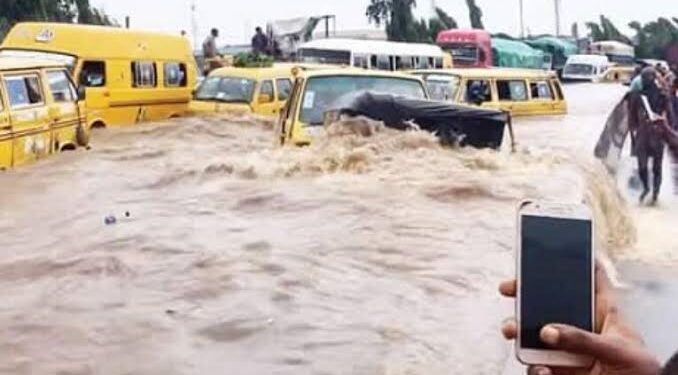FG Issues 5-Day Flood Alert for 19 States Amid Rising Casualties Nationwide

By Ibrahim Kegbegbe
Lagos, Nigeria – August 6, 2025
The Federal Government has issued a five-day flood warning for 19 states across Nigeria, citing heavy rainfall forecasts and the increasing risk of widespread flooding from Tuesday, August 5, through Saturday, August 9, 2025.
The alert, released by the National Flood Early Warning Systems Centre under the Ministry of Environment, comes amid escalating flood disasters that have already claimed at least 165 lives, left 82 people missing, and displaced more than 44,000 Nigerians this year alone.
According to the forecast, 76 communities across 19 states—including Niger, Benue, Kebbi, Kaduna, Kano, Borno, Taraba, Ebonyi, and Cross River—are at high risk of river and urban flooding due to excessive rainfall and overflowing waterways.
“This warning is not speculative; it is a matter of public safety. The coming days are crucial,” said Dr. Ibrahim Inuwa, Director of the National Flood Early Warning Centre, during a press briefing in Abuja. “We urge all residents in vulnerable areas to remain alert and follow instructions from emergency services.”
READ ALSO:Ambassador Ajadi Accuses U.S. Embassy in Nigeria of Exploiting Visa Applicants
States and Communities at Risk
The full list of affected states includes:
Akwa Ibom, Bauchi, Benue, Borno, Cross River, Ebonyi, Gombe, Jigawa, Kaduna, Kano, Katsina, Kebbi, Nasarawa, Niger, Plateau, Sokoto, Taraba, Yobe, and Zamfara.
Specific flood-prone communities within these states were identified in the report, with the agency advising state governments to activate evacuation and response protocols.
Background: A Nation Under Water
Flooding has already devastated communities across Nigeria in 2025. In May, a massive flood in Mokwa, Niger State, reportedly killed over 200 people, with hundreds more declared missing and entire villages submerged. The disaster, which followed torrential rains and the collapse of a makeshift dam, has been described as one of the worst in recent memory.
READ ALSO:Don’t Drown in Confusion: Know Your “Flood” from Your “Flooding”!
In July, Gombe and Ogun States recorded severe flash floods that destroyed homes, displaced families, and disrupted economic activity. Lagos, Delta, and Anambra have also experienced significant urban flooding, leading to property loss, public health risks, and transportation paralysis.
In total, over 120,000 people have been affected nationwide, while thousands of hectares of farmland and livestock have been washed away—threatening food security and livelihoods.
Government and Expert Response
The Minister of Environment, Balarabe Abbas Lawal, acknowledged the grim reality of climate-induced disasters but emphasized that “early warning must translate into early action.”
In response, the National Emergency Management Agency (NEMA) and the Nigerian Meteorological Agency (NiMet) have been tasked with issuing real-time updates, mobilizing relief materials, and supporting states in evacuation logistics.
“Flooding is no longer seasonal or random—it is persistent and worsening due to climate change and poor urban planning,” said Mr. Kehinde Teluwo, a Estate Management expert in Lagos, “This is a national emergency, and we must treat it as such.”
Call to Action
Residents in vulnerable areas are advised to:
Move to higher ground and temporary shelters provided by authorities.
Avoid walking or driving through floodwaters.
Secure personal documents and valuables in waterproof containers.
Follow updates from NiMet, NEMA, and state emergency agencies.
Meanwhile, humanitarian organizations have called on the federal government to allocate emergency funds, improve drainage systems, and increase public sensitization.
As climate extremes become the new normal, Nigeria faces an urgent choice: act now or endure deeper human and economic losses. With this 5-day warning, the window for life-saving action is narrow—but not closed.
“The water is coming,” Teluwo reiterated. “Let us not wait until we are counting the dead to take action.”

















